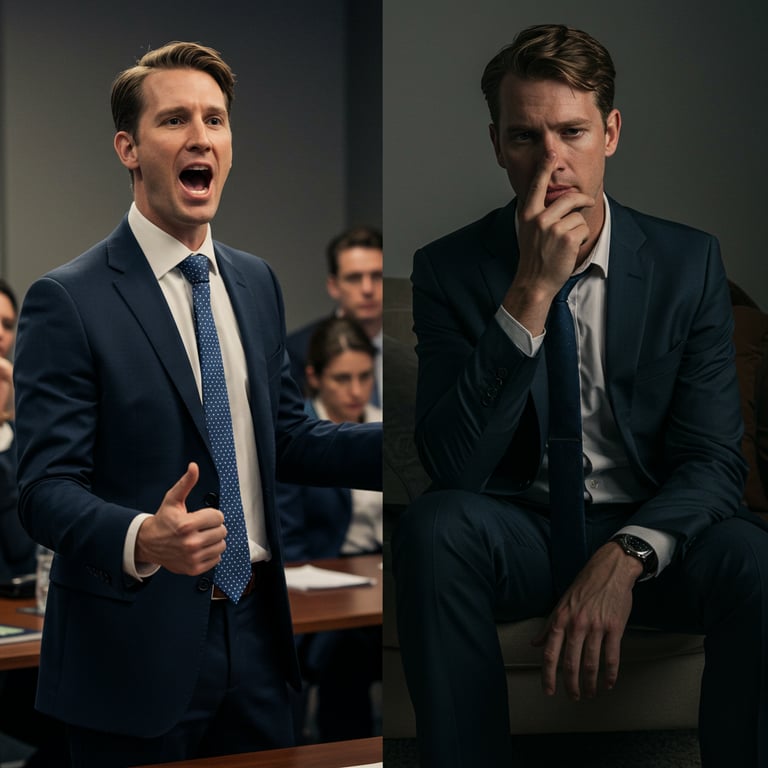The Hidden Emotional Toll of Practicing Law
This article explores how burnout, anxiety, and emotional suppression quietly affect high-performing lawyers. It offers a clear look at why traditional coping strategies fall short—and how therapy, including EMDR and parts work, helps attorneys reconnect with focus, clarity, and emotional regulation.
LAWYERANXIETYBURNOUTEMDR THERAPY


The Hidden Emotional Toll of Practicing Law
You’ve built a life around sharp thinking, high expectations, and winning outcomes.
People see you as composed, persuasive, and in control.
And most days—you are.
But lately, something feels off:
You're tense all the time, even outside of work
Your thoughts won’t slow down
You replay conversations, second-guess decisions, anticipate criticism
You snap at people you care about—then regret it
Even when you’re “off,” your mind is still on
This isn’t failure.
It’s lawyer burnout.
The emotional cost of a profession that rewards control—and punishes vulnerability.
What Emotional Strain Looks Like in Lawyers
Lawyers don’t always show distress the way others do.
Instead of falling apart, you often overfunction:
You get sharper, not slower
You stay busy to avoid spiraling
You self-isolate instead of opening up
You double-check everything
You keep going—even when you're drained
Outsiders call it “high performance.”
But behind the scenes, anxiety, chronic stress, and emotional fatigue can quietly build up.
You know it’s starting to take a toll.
You may notice a growing disconnect from your own emotions. Moments of accomplishment feel muted, and even downtime doesn’t offer relief. It’s not about lacking resilience—it’s about carrying too much, for too long, without mental health support tailored to lawyers.
You might find that weekends and vacations don’t bring rest, only distraction. You scroll, zone out, or drink more than usual—not because you're irresponsible, but because your system doesn't know how to truly downshift.
Some clients describe it as emotional claustrophobia: everything looks fine on the outside, but inside, there’s no air.
Why So Many Lawyers Don’t Seek Therapy (Until They’re Quietly Overwhelmed)
Because you’re trained to:
Anticipate problems
Hide emotion
Be the smartest, calmest person in the room
Treat doubt as weakness
And therapy can feel like the opposite of that—soft, meandering, unstructured.
But here’s the truth:
The right therapy isn’t about feelings for feelings’ sake.
It’s about system-level clarity—the same way you approach complex cases.
Except this time, the system is you.
Therapy for lawyers gives you space to get strategic about your internal world, not just your external output. That’s what most high-functioning professionals are missing—an internal operating system check.
What Therapy Looks Like for Lawyers
This isn’t therapy that pathologizes you.
It’s structured, intelligent, and emotionally precise work designed for people whose minds run fast—and whose nervous systems have kept up longer than they should.
We use proven methods like:
EMDR Therapy
To process past moments that left an imprint: rejection, humiliation, family pressure, or years of emotional self-control. Especially useful when you’ve intellectualized but haven’t released something.Parts Work
To help you understand the inner conflict: the critic, the avoider, the perfectionist, the side that never rests. You’re not broken—just internally split.Depth-Oriented Therapy
To explore what’s underneath the overachievement, and reconnect to something more stable than just "doing more."
This kind of therapy doesn’t slow you down—it sharpens your internal clarity so you can think, lead, and respond with less emotional drag. When you stop burning energy managing suppressed emotion, you start gaining it for what actually matters.
Therapy doesn’t mean you become someone else. It means you finally gain access to more of who you already are—without having to armor up all the time.
Case Story Edited For Privacy: The Corporate Litigator Who Couldn’t Unwind
Nadia, a partner at a major firm, came to therapy feeling “wired and exhausted.” She wasn’t sleeping. She was snapping at her kids. And she felt guilty for not being more grateful.
At first, she didn’t know what to say in therapy. “I don’t do feelings,” she admitted.
But over time, we uncovered the inner machinery running her life: a part of her that believed if she slowed down, she’d be overtaken. Another part that feared being seen as weak. Another that missed her old self—the version of her that used to laugh, cry, or feel anything other than pressure.
We used EMDR to process some moments from her early career: a failed motion she blamed herself for, a senior partner who undermined her in public, a grueling custody case that shook her more than she ever admitted. We used parts work to help her develop internal leadership—so she could listen to her needs without caving to them.
She didn’t leave her job. She didn’t become “softer.”
But she became whole.
What Changes When You Do the Work
Clients often say:
“I’m not spiraling after every mistake.”
“I can finally sleep without replaying the day.”
“I’m not so hard on myself.”
“I feel more clear—even when things are messy.”
“I’m still sharp. I’m just not suffering.”
When lawyers stop treating themselves like a never-fail machine, real healing starts.
Therapy doesn’t dull your edge.
It integrates the parts of you that have been working overtime to keep it all together.
FAQs: Emotional Suppression and Therapy for Lawyers
Is it normal to feel emotionally numb even when work is going well?
Yes. High performers often suppress so much for so long that positive emotions also get dulled.
Will therapy make me less productive or ambitious?
No. In fact, clients report being more focused and efficient—because they’re no longer wasting internal energy managing emotion.
I’m not in crisis. Should I still reach out?
You don’t need to be falling apart to benefit from therapy. You just need to be curious about how you’re really doing underneath it all.
Can I do this even if I’ve never been to therapy before?
Absolutely. The process is structured and collaborative. You set the pace. You don’t need to be “good at feelings” to begin.
Want to Find Out What’s Driving Your Stress Behind the Scenes?
Book a free 30-minute Zoom consultation.
You don’t need to commit. Just explore whether this kind of therapy might actually work for someone like you.
